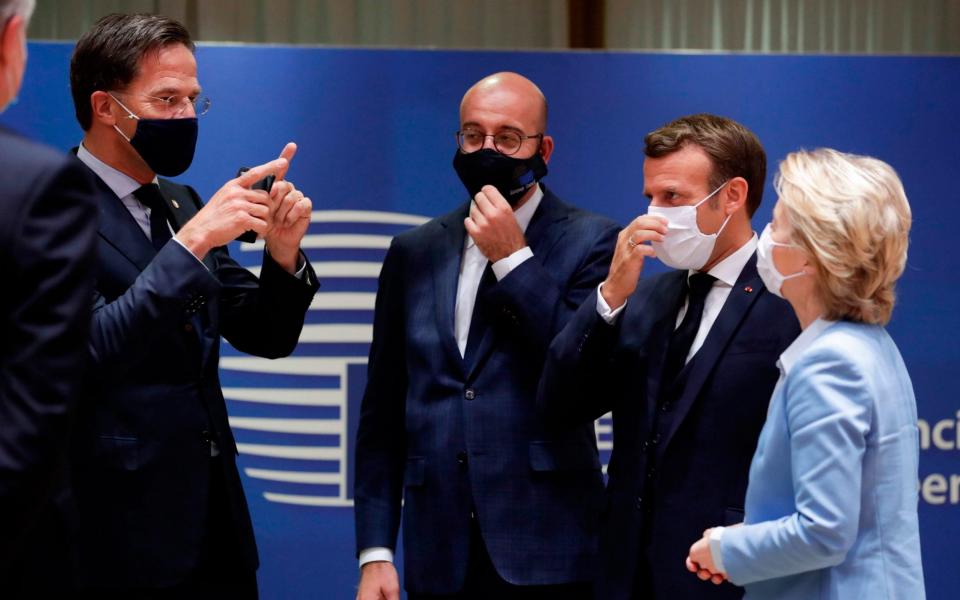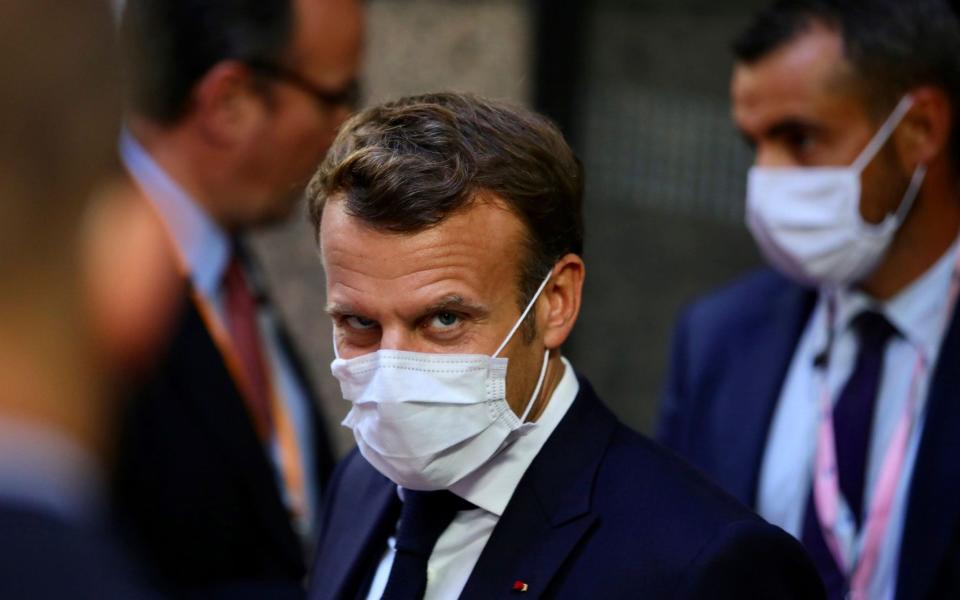Why the Dutch are ready to lead the EU naysayers after UK's exit

The Europeans called him Dr No for opposing a no-strings-attached EU coronavirus bailout but in The Netherlands there’s support for prime minister Mark Rutte’s “careful” stance.
In tense negotiations in Brussels earlier this month, Rutte was slammed as ringleader of the ‘frugal four’ nations, with Austria, Sweden and Denmark. They ensured more of a Next Generation EU €750bn (£677bn) corona bailout fund consisted of loans rather than subsidies, with an “emergency brake” if states are deemed to be dragging their feet on reforms intended to make their economies more resilient.
It's a sceptical position that the Netherlands used to share with the UK, and French president Emmanuel Macron isn’t alone in pointing out that the Dutch are stepping into British shoes as chief naysayer. At a particularly tense moment during talks, Macron reportedly slammed his fist on the table, accusing Rutte of behaving like former British prime minister David Cameron. He pointed out that this “ended badly” for Cameron, who lost a Brexit referendum and his job.
Dutch analysts believe that the country is indeed without a bigger ally now that Britain is no longer part of the seven-year budget negotiations. “The way the Dutch view Europe has always been a bit ambiguous,” says Clara van de Wiel, EU correspondent for the NRC newspaper. “In the past, we always had the United Kingdom to defend that frugal position in budget negotiations. That is a big change that has forced the Dutch into a different role.”
As a small, relatively rich trading nation, European business is vital to the Dutch and it is also the highest net per-head contributor to EU budgets. Almost three quarters of its exports go to EU countries, 57pc of immigrants to the Netherlands come from the EU, most often temporarily and for work, and public trust in the EU was higher than in the Dutch parliament in recent years, according to Statistics Netherlands.
But while its dependence on Europe is recognised, the country’s Calvinist past carries through into how government spending is viewed. “Government budgets are often treated like household budgets, with the mother of the family being careful not to spend too much,” says Tom van der Meer, a professor of political science at Amsterdam University.
“That really appeals to Dutch voters traditionally, and that’s the argument that has been made from April onwards by the minister of finance and prime minister, saying: we are willing to help out because these are extraordinary times, but we need to make sure this doesn’t happen again, so balancing the budget is very important.”
While Rutte has been careful to position European disagreements as “professional” – suggesting that fists on the table could be related to “tiredness” – his finance ministers have been less diplomatic. Finance minister Wopke Hoekstra was forced to admit he had not shown enough “empathy” to southern Europe after initially refusing help in March.
Meanwhile, in 2017, Jeroen Dijsselbloem, head of the Eurozone’s finance ministers, sparked fury by implying southern European states wasted their cash on “wine and women” before asking for more subsidies. According to correspondents for Italian and Spanish media, these Dutch comments rankled – but in the Netherlands, there was a lot of sympathy for them.
“The Dutch see themselves as people who are very good with money, save a lot, and have buffers but those nations don’t have them,” says Van de Wiel. “That might not be completely correct, but there are of course stereotypes about southern Europeans, just as there are in southern Europe about the Germans and the Dutch.”
For Rutte, playing tough in Europe had political advantages at home, with a general election looming in March and a recent growth in far-right Eurosceptic parties such as Geert Wilders’ Party for Freedom and the Forum for Democracy.

“The support of the left is not a problem for him,” says Bart van den Braak, professor in public law at Maastricht University and a researcher at the Montesquieu Institute think tank. “His own party [the Liberal VVD] used to be rather pro-European but is now more sceptical, partly because its opponents are the new right parties. That’s what he has to consider: that they are not going to frame him as too pro-European.”
Actually, Rutte is not known for his principles, but as a shape-shifting deal maker. “The Dr No, No, No isn’t something he shows publicly in the Netherlands: it’s a position he has taken up in Europe, particularly over the past few months,” says Van der Meer, who points out that Rutte has managed three coalition governments of hugely different politics. “In the Netherlands you’d better describe him as the manager who allows other parties to shine, who’s able to change tactics or positions if need be. That’s useful in a fragmented country.”
Another side effect of the Dutch system, which has a government of four parties and 15 separate groups in parliament, is that personality matters. “In public, he’s always very sociable and I think most people like him, even his opponents… although I don’t know about Mr Orbán [the Hungarian prime minister who recently said Rutte hated Hungary],” says Van den Braak.
Without a parliamentary majority, for instance, Rutte was recently forced to appeal to people’s common sense to manage his Covid-19 “intelligent lockdown” – and he is still benefiting from a boost in popularity, according to Van der Meer’s research.
“Rutte’s personal popularity has increased quite a bit, with a rally around the flag, a big increase in trust in government and decrease in feelings of cynicism about politicians,” he says. “His party has shot up in the polls and we know from other studies that this boost gives you more leeway with the public: they are more likely to support your policies, be it the lockdown or 1.5 million society, and probably also his position regarding European collaboration.”
The only major criticism in the Netherlands has come from Wilders and the Socialist Party (SP). Mahir Alkaya, financial affairs spokesman for the SP, says his party supported a far smaller no-strings “solidarity” fund months ago rather than a cash grab by the European Commission.
“We see a European Commission that has used this occasion to attract more money to give subsidies and loans,” he says. “Rutte has tried to form an opposition, and I do applaud that, but he didn’t succeed. There are many things in that fund that have nothing to do with corona, but the commission has used the momentum to push forward with matters like the ambition for digitalisation.
“Rutte is a true Liberal and we can imagine he does feel the loss of Britain in these negotiations.”

 Yahoo Movies
Yahoo Movies 